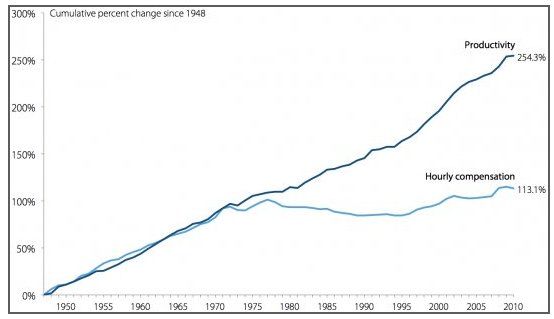Many people are blaming the Great Recession for the current economy, where CEOs are raking in millions as stocks and profits soar, while everyone else is struggling. But the decline of the working-class has been going on for decades.

|
|
The
Speech: A Historic Filibuster on Corporate Greed and the Decline of Our Middle
Class
On Friday, December 10, 2010, Vermont Senator Bernie Sanders walked on to the floor of the United States Senate and began speaking. It turned out to be a very long speech, lasting over eight and a half hours. And it hit a nerve. Millions followed the speech online until the traffic crashed the Senate server. A huge, positive grassroots response tied up the phones in the senator’s
offices in Vermont and Washington. President Obama reportedly held an impromptu
press conference with former President Clinton to deflect media attention away
from Sander' speech. Editorials and news coverage appeared throughout the world. But the speech was more than a critique of a particular piece of legislation.
It was a dissection of the collapse of the American middle class and a
well-researched attack on corporate greed and on public policy which, over the
last several decades, has led to a huge growth in millionaires even as the
United States has the highest rate of childhood poverty in the industrialized
world. It was a plea for a fundamental change in national priorities, for
government policy that reflects the needs of working families, and not just the
wealthy and their lobbyists. |
|
|
Saving
Capitalism: For the Many, Not the Few
From the author of Aftershock and
The
Work of Nations, Robert Reich's most important book to date — a myth-shattering breakdown of how the economic system that helped make America so strong is now failing us, and what it will take to fix it. |
|
|
The
Essential Bernie Sanders and His Vision for America
The progressive Independent Senator Bernie Sanders―with a thirty-five-year career in public service―is campaigning to become president of the United States. His goal is to build a movement to take back our country from the rich and powerful, and return it to its rightful owners―we, the American people. Sanders’ common sense, populist message is resonating with Democrats, Republicans and Independents—as well as ordinary working- and middle-class Americans from all walks of life, including Millennials, seniors, veterans, immigrants, environmentalists, union workers, and more. In this short, accessible book draws heavily from Sanders’ ample public record of speeches, statements, and interviews, and couples his working-class spirit with specific legislation he has championed on a number of core proposals that comprise a broader people’s agenda for America, including:
|
|
|
The
Price of Inequality: How Today's Divided Society Endangers Our Future
America currently has the most inequality, and the least equality of opportunity, among the advanced countries. While market forces play a role in this stark picture, politics has shaped those market forces. In this best-selling book, Nobel Prize–winning economist Joseph E. Stiglitz exposes the efforts of well-heeled interests to compound their wealth in ways that have stifled true, dynamic capitalism. Along the way he examines the effect of inequality on our economy, our democracy, and our system of justice. Stiglitz explains how inequality affects and is affected by every aspect of national policy, and with characteristic insight he offers a vision for a more just and prosperous future, supported by a concrete program to achieve that vision. |
|
|
Beyond
Outrage: What has gone wrong with our economy and our democracy, and how to fix
it America’s economy and democracy are working for the benefit of an
ever-fewer privileged and powerful people. But rather than just complain about
it or give up on the system, we must join together and make it work for all of
us. Beyond Outrage connects the dots, showing why the increasing share of income and wealth going to the top has hobbled jobs and growth for everyone else, undermining our democracy; caused Americans to become increasingly cynical about public life; and turned many Americans against one another. He also explains why the proposals of the “regressive right” are dead wrong and provides a clear roadmap of what must be done instead. |
|
|
The
Two-Income Trap: Why Middle-Class Parents are Going Broke
In this revolutionary exposé, Harvard Law School bankruptcy expert Elizabeth Warren and financial consultant Amelia Tyagi show that today's middle-class parents are increasingly trapped by financial meltdowns. Astonishingly, sending mothers to work has made families more vulnerable to financial disaster than ever before. Today's two-income family earns 75% more money than its single-income counterpart of a generation ago, but has 25% less discretionary income to cover living costs. This is "the rare financial book that sidesteps accusations of individual wastefulness to focus on institutional changes," raved the Boston Globe. Warren and Tyagi reveal how the ferocious bidding war for housing and education has silently engulfed America's suburbs, driving up the cost of keeping families in the middle class. The authors show why the usual remedies-child-support enforcement, subsidized daycare, and higher salaries for women-won't solve the problem. But as the Wall Street Journal observed, "The book is brimming with proposed solutions to the nail-biting anxiety that the middle class finds itself in: subsidized day care, school vouchers, new bank regulation, among other measures." The Two-Income Trap has created a sensation among economists, politicians, and families-all those who care about America's middle-class crisis. |

VANITY FAIR: JPMorgan C.E.O Jamie Dimon Says It’s Pointless to Slash C.E.O. Pay
ReplyDeletehttp://www.vanityfair.com/news/2015/09/jamie-dimon-ceo-pay
L.A. TIMES: What is fair pay for a chief executive?
http://www.latimes.com/business/la-fi-laz-ceo-compensation-20150923-column.html
Economic Policy Institute: State-Level Data Show Incomes Continue to Stagnate in Households Across the Map
http://www.epi.org/blog/state-level-data-show-incomes-continue-to-stagnate-in-households-across-the-map/